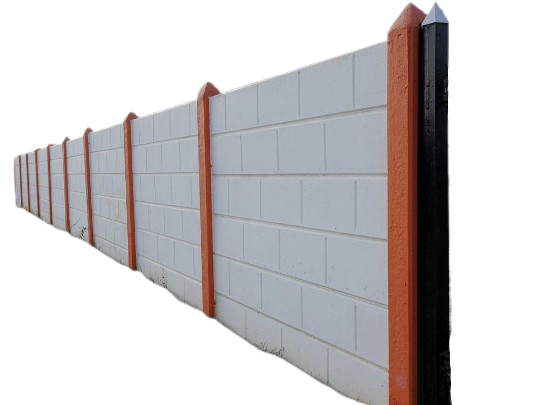Precast Compound Wall in Delhi

In the realm of construction, the demand for efficient and cost-effective building materials and techniques continues to drive innovation. Precast compound walls have emerged as a popular choice for various applications, offering numerous advantages over traditional construction methods. These walls are precast off-site and then assembled on-site, providing a quick and efficient solution for enclosing properties, securing boundaries, and enhancing aesthetics.
This article explores the concept of precast compound walls, their advantages, and their applications in different settings. We will delve into the construction process, the benefits they offer, and the diverse range of applications they can cater to.
Understanding Precast Compound Walls
Precast compound walls are modular wall systems that are manufactured off-site in controlled environments. These walls are typically made of reinforced concrete or other materials, such as precast concrete panels. The panels are cast in molds and cured before being transported to the construction site for assembly.
The construction process involves careful planning, precise measurement, and skilled craftsmanship. The panels are cast with various design elements, such as textures, patterns, and finishes, to meet specific aesthetic requirements. Once on-site, the panels are erected and joined together using techniques like interlocking, bolting, or welding.
Advantages of Precast Compound Walls
1. Time and Cost Efficiency:
One of the significant advantages of precast compound walls is their ability to significantly reduce construction time. Since the panels are manufactured off-site, weather conditions and site constraints do not affect the production process. As a result, on-site labor and construction time are reduced, allowing for faster project completion.
Furthermore, precast compound walls can be manufactured in large quantities, taking advantage of economies of scale. The repetitive nature of the manufacturing process allows for efficient use of materials and reduced wastage. This cost-effective approach translates into savings for both the builder and the end-user.
2. Durability and Strength:
Precast compound walls are known for their exceptional durability and strength. The manufacturing process involves using high-quality materials and strict quality control measures, resulting in robust panels that can withstand environmental factors, such as harsh weather conditions, impact, and wear and tear.
Additionally, precast compound walls can be reinforced with steel or other materials to enhance their load-bearing capacity. This makes them suitable for various applications, including industrial complexes, residential projects, commercial establishments, and infrastructure projects.
3. Customization and Aesthetic Appeal:
Precast compound walls offer a wide range of design possibilities. The panels can be customized with different textures, patterns, and finishes, enabling architects and builders to create visually appealing structures that blend seamlessly with the surroundings. The customization options allow for the integration of branding elements, logos, or artistic designs, adding a unique touch to the compound walls.
4. Low Maintenance:
Once installed, precast compound walls require minimal maintenance. The high-quality materials used in their construction make them resistant to corrosion, cracks, and degradation. Routine cleaning and occasional inspections are usually sufficient to keep these walls in excellent condition for an extended period, resulting in long-term cost savings for the property owner.
Applications of Precast Compound Walls
Residential Complexes and Housing Projects:
Precast compound walls are widely used in residential complexes and housing projects. They offer privacy, security, and making them an ideal choice for boundary walls around individual homes, gated communities, and apartment complexes. The aesthetic appeal of precast walls adds to the overall ambiance and value of the residential property.
Industrial and Commercial Developments:
In industrial and commercial settings, precast compound walls serve multiple purposes. They can be used to secure factory premises, warehouses, storage yards, or construction sites. The durability and strength of precast walls provide protection against trespassing, theft, and unauthorized access. Additionally, the customization options allow businesses to incorporate their logos or branding elements on the walls, enhancing their corporate identity.
Institutional and Government Facilities:
Precast compound walls find applications in institutions such as schools, colleges, hospitals, and government buildings. These walls serve as a boundary marker, offering security and privacy to the premises. They can be designed to match the architectural style of the institution and can also incorporate safety features like anti-climbing measures or surveillance provisions.
Infrastructure Projects:
In infrastructure projects, such as highways, railways, or airports, precast compound walls play a crucial role in demarcating the boundaries and ensuring safety. They provide visual separation and prevent unauthorized access, contributing to the overall security and smooth functioning of these projects. The ease and speed of installation make precast compound walls an efficient choice for large-scale infrastructure developments
Conclusion
Precast compound walls have emerged as a versatile and efficient solution for enclosing properties, securing boundaries, and enhancing aesthetics. With their time and cost efficiency, durability, customizable design options, and low maintenance requirements, these walls offer significant advantages over traditional construction methods. Their applications range from residential complexes and industrial developments to institutional facilities and infrastructure projects.
As the construction industry continues to evolve, precast compound walls are poised to become even more popular due to their inherent benefits. Architects, builders, and property owners can harness the advantages of precast compound walls to create functional and visually appealing spaces that meet the demands of modern construction.
By adopting precast compound walls, construction projects can benefit from faster completion times, cost savings, and improved quality, contributing to overall project success and customer satisfaction. With ongoing advancements in materials and manufacturing techniques, the future looks promising for the widespread adoption of precast compound walls in the construction industry.

